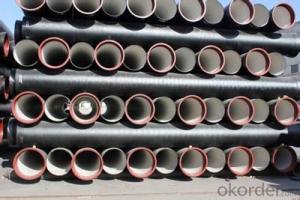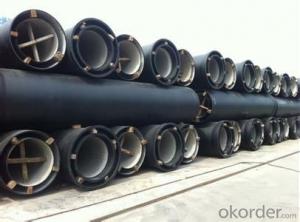DUCTILE IRON PIPE C Class DN80
- Loading Port:
- China Main Port
- Payment Terms:
- TT OR LC
- Min Order Qty:
- -
- Supply Capability:
- -
OKorder Service Pledge
OKorder Financial Service
You Might Also Like
Ductile Iron Cast Pipe is without any defects compare with tradition casting tech, which has many advantages particularly as follow:
(1) High density. In the "vertical upward casting" process, the melt iron of centre liquid column in center crystallizer is continuously feeding for volume shrinkage caused by condensation tube at outer circumference , which lead to be free of shrinkage porosity.
(2) High purity. When melt iron pouring, the mixed impurities such as gas, dross, sand grain which are lighter than melt iron could be eliminated at furnace mouth, its impossible to enter into the crystallizer through the channel, so the melt iron into the crystallizer is very pure.
(3) Strength with toughness. The cooling speed provided by continuous crystallizer is 30 times than sand casting and 5 times than centrifugal casting, and doesn't produce white iron, the eutectic cell volume of continuous cast iron is one eighth to one tenth compare with traditional cast iron. The density of graphite nodule in ductile iron can reach 300-700 pcs/mm2. Therefore, all reason above improve the strength and toughness of continuous cast iron.
(4) Free machining. The high speed cooling make the hardening phase (such as boride, steadite) not appear like reticular, massive or thick, but diffuse like fish bone and pane in shape, moreover, there are tiny graphite flakes inlaid hardening phase. It's free machining in BrinellHardness the range of 250-300HB. However, the Brinell Hardness of 250 is top limit to common metal materials.
(5) Uniform composition of tube wall. The convection mixing of liquid column caused by marching type drawing in crystallizer make the composition of tube wall well-distributed, and concentration gradient very little.
(6) High productivity. To the wall thickness of tube under 10mm, the speed of continuous casting is 1 meter/min, to the wall thickness of tube under 20mm, the speed of continuous casting is 0.5 meter/min, which is high efficiency that centrifugal or other casting tech couldn't reach.
- Q:Can ductile iron be welded? Is weldability comparable to gray iron?
- Nodular cast iron welding can be determined, this should be in some high strength cast iron equipment used more, the tensile strength of normally ductile cast iron welding in welding is higher, is worse than the grey cast iron, it is actually very difficult to distinguish with the naked eye is ductile iron or cast iron the iron in the repair equipment, we usually use WE777 special cast iron electrode universal wide welding, but it is only for maintenance use, the effect is really good, reducing the risk of cracking and high strength welding rod matching to ensure the strength of welding.
- Q:Are ductile iron pipes suitable for use in industrial applications?
- Yes, ductile iron pipes are suitable for use in industrial applications. Ductile iron pipes are known for their high strength and durability, making them ideal for handling the demands of industrial environments. They are resistant to corrosion and can withstand high pressures and temperatures. Additionally, ductile iron pipes have excellent impact resistance, making them suitable for use in areas with heavy traffic or potential for mechanical damage. Their flexibility allows them to absorb vibrations and shocks, further enhancing their suitability for industrial applications. Overall, ductile iron pipes are a reliable and cost-effective choice for various industrial sectors such as water and wastewater treatment, mining, power generation, and chemical plants.
- Q:Can ductile iron pipes be used for geothermal energy systems?
- Certainly, geothermal energy systems can utilize ductile iron pipes. Ductile iron, being a robust and long-lasting substance, possesses the capacity to endure the frequently encountered elevated temperatures and pressures in geothermal energy systems. Its ability to resist corrosion and exhibit high tensile strength renders it a perfect selection for conveying geothermal fluids. Furthermore, the ease of joining ductile iron pipes permits flexibility and adaptability during the design and installation phases. All in all, ductile iron pipes prove to be a trustworthy and economically viable alternative for geothermal energy systems.
- Q:The difference between ductile iron pipe and UPVC drain pipe
- UPVC tube or rigid polyvinyl chloride pipe, U-PVC pipe, is a kind of strong corrosion resistance, acid and alkali salt oil medium erosion, light quality, has certain mechanical strength, good hydraulic conditions, convenient installation, but easy to aging, high temperature resistant, but can not withstand the impact, applied to the domestic water system, DN50 pipe connection DN65, using a ring connected with the above.
- Q:What is the lifespan of ductile iron pipe?
- Various factors, such as pipe quality, installation environment, and maintenance practices, can influence the lifespan of ductile iron pipe. On average, this type of pipe typically lasts between 80 and 100 years. This impressive longevity can be attributed to the inherent durability and strength of ductile iron, enabling it to withstand high pressure, external loads, and environmental conditions. Moreover, ductile iron pipe is often coated with protective linings, such as cement mortar or epoxy, to enhance its resistance to corrosion and extend its lifespan. Regular inspections and maintenance also play a crucial role in prolonging the life of ductile iron pipe by promptly identifying and addressing potential issues. Ultimately, with proper installation, maintenance, and care, ductile iron pipe can provide a reliable and long-lasting service for several decades.
- Q:Can ductile iron pipes be used in culvert or storm sewer applications?
- Yes, ductile iron pipes can definitely be used in culvert or storm sewer applications. Ductile iron pipes are known for their strength, durability, and flexibility, making them ideal for such applications. They have the ability to withstand heavy loads, resist corrosion, and handle high flow rates, making them a reliable choice for culverts and storm sewers. Ductile iron pipes also have a long service life and require minimal maintenance, further adding to their suitability for these applications. Additionally, ductile iron pipes can be easily installed and are available in various sizes and configurations to meet the specific requirements of culvert or storm sewer projects. Overall, ductile iron pipes are a proven and widely used option for culvert or storm sewer applications, providing efficient and long-lasting performance.
- Q:Qianwei County ductile iron pipe which tool to use cutting convenience?
- Cutting method for cutting ductile iron pipes, in order to obtain neat kerf, we should start with a direction of play saw saw to end. If the requirement of the section is not high, the direction of sawing can be changed gradually to reduce the resistance and facilitate cutting in.
- Q:The design uses water supply ductile iron pipe, PE corrosion protection pipe, HDPE pipe, please ask that good? What's the price of the two?
- PE pipe is hot melt connection (with thick wall smooth type, don't use the wavy), has the advantages of convenient connection, not affected by terrain, but should pay attention to cold and rain when try not to do, otherwise easily lead to cracks or Water Leakage interface touch interface. The disadvantage is not pressure, heavy machinery on the flat, but the problem is not, as long as the water does not leak, do not need to redo. Also, PE price volatility is relatively large, the size of the price difference is relatively large, a few more runs to ask the price.
- Q:Do ductile iron pipes require special maintenance?
- Yes, ductile iron pipes do require special maintenance. While ductile iron is known for its strength and durability, it is still susceptible to certain forms of corrosion. Regular maintenance is necessary to prevent corrosion and prolong the lifespan of the pipes. This maintenance typically includes periodic inspections to check for any signs of corrosion or damage, as well as cleaning and protective coating applications. Additionally, proper handling and installation techniques should be followed to ensure the integrity of the pipes. Regular maintenance and adherence to industry best practices can help prevent leaks, breaks, and other issues, ultimately saving time and money in the long run.
- Q:Can ductile iron pipes be used for stormwater management systems?
- Indeed, stormwater management systems can utilize ductile iron pipes. Renowned for their robustness and lastingness, ductile iron pipes prove fitting for diverse purposes, including stormwater management. These pipes exhibit resistance against corrosion and possess the ability to endure immense pressure, rendering them perfect for transporting stormwater runoff. Moreover, ductile iron pipes boast an extended lifespan, thereby minimizing the necessity for frequent replacements and upkeep. All in all, when it comes to stormwater management systems, ductile iron pipes serve as a dependable option.
1. Manufacturer Overview |
|
|---|---|
| Location | |
| Year Established | |
| Annual Output Value | |
| Main Markets | |
| Company Certifications | |
2. Manufacturer Certificates |
|
|---|---|
| a) Certification Name | |
| Range | |
| Reference | |
| Validity Period | |
3. Manufacturer Capability |
|
|---|---|
| a)Trade Capacity | |
| Nearest Port | |
| Export Percentage | |
| No.of Employees in Trade Department | |
| Language Spoken: | |
| b)Factory Information | |
| Factory Size: | |
| No. of Production Lines | |
| Contract Manufacturing | |
| Product Price Range | |
Send your message to us
DUCTILE IRON PIPE C Class DN80
- Loading Port:
- China Main Port
- Payment Terms:
- TT OR LC
- Min Order Qty:
- -
- Supply Capability:
- -
OKorder Service Pledge
OKorder Financial Service
Similar products
New products
Hot products
Related keywords


























